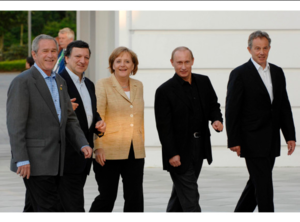Boeing CEO David Calhoun Made $22.5 Million in 2023 While Boeing’s Weapons Kill Civilians in Senseless U.S. Wars
By Jeremy Kuzmarov - December 4, 2023 0

Boeing CEO David Calhoun [Source: foxbusiness.com]
Calhoun Also Received $15 Million in Extra Stock Shares! He and Other Top Defense Contractor Executives Are Being Put on Trial by Citizen-Peace Group Holding Them Accountable for Their Crimes
Life is great for Boeing CEO David Calhoun,[1] who was paid a salary of $22.5 million in 2023 and received a bonus of $15 million in extra Boeing stock shares.
But Calhoun is now a defendant in a tribunal run by Brad Wolf a former prosecutor from Lancaster, Pennsylvania, and other peace activists who have charged him and the CEOs of top defense contractors with war crimes for producing weapons that have been used to kill civilians in illegal wars undertaken in violation of the Geneva Convention and UN Charter.

[Source: merchantsofdeath.org]
The model for the tribunal is the Nuremberg trials after World War II which tried and convicted the executives of German war industries, notably I.G. Farben, Krupp and Flick, for war crimes.

Friedrich Flick receives his sentence during the Nuremberg trial. [Source: wikipedia.org]
CovertAction Magazine previously reported on the opening session of the tribunal on November 12, which focused on corporate arms sales to Israel and Israeli war crimes in Gaza.
The second session of the tribunal was held on November 19 and focused on U.S. war crimes in Syria and corporate complicity in them.
Wolf narrated a short documentary explaining that the U.S. intervened in Syria starting in 2011 by supporting opposition groups that aimed to topple Syrian President Bashar al-Assad and justified further military operations by claiming to be fighting against the Islamic State in Syria and the Levant (ISIS), which was trying to take over the country.
The CIA has spent billions of dollars in Syria in its largest operations since Afghanistan in the 1980s.

CIA proxies in Operation Timber Sycamore. [Source: adamfitzgerald911.wordpress.com]
According to Wolf, the real reason for the U.S. intervention was not to fight ISIS, but rather to secure control over Syria’s northern oil fields. The U.S. military functions as a “privatized corporate police force” in Syria, enabling the theft of the country’s oil.
Colonel Lawrence Wilkerson, former chief of staff to Secretary of State Colin Powell, said that the United States “was in Syria illegally” as they had not been invited into the country by the current government. The cover story was Iran, but the U.S. military was really in Syria to “protect the oil flow to Israel, with Syria’s oil going to Israel at discounted prices and Israel attacking Syria too from time to time.”
Wilkerson added that none of this was reported anywhere in the U.S. media: “It may have been reported in Syria or Turkey but not in our media. The American public is not told even that we have troops in Syria.”
According to Wolf, U.S. leaders have claimed as a legal pretext for intervention Congress’s authorization for the use of military force against terrorist forces that allegedly attacked the U.S. on 9/11, though Syria actually had nothing to do with 9/11 and ISIS is “not part of al-Qaeda.”

Colonel Lawrence Wilkerson [Source: sott.net]

Brad Wolf [Source: merchantsofdeath.org]
The injustice of the illegal U.S. involvement in Syria has been compounded by egregious war crimes such as the March 2017 bombing of the Tabqa Dam on the Euphrates River using BLU-109 bunker-busting bombs made by General Dynamics.

Tabqa Dam [Source: wikipedia.org]
U.S. bombers also struck a school in the city of Raqqa, which was devastated after ISIS took it over in what Amnesty International called a “U.S.-led war of annihilation.”
Wolf’s documentary quoted Raqqa residents who said they did not understand why the U.S. had bombed their city and compared the level of destruction to Dresden during World War II.
More than 11,000 buildings were destroyed and an unknown number of civilians were killed.

Scene from Raqqa, Syria, after U.S. bombing. [Source: nytimes.com]
One of the chief bombers carrying out the attack was the F-18 made by Boeing.
Artillery rounds and howitzers that contributed to the destruction of buildings were made by Lockheed Martin and Raytheon—another defendant in the tribunal—and drones were made by General Atomics, another defendant.

Lockheed AC-130 gunship. [Source: getwallpapers.com]

General Atomics Reaper drone. [Source: britannica.com]
This war, according to Wolf, was again driven by oil and profiteering by U.S. oil companies, which hoped to access billions of barrels from off-shore oil deposits. John D. Harris, a member of the ExxonMobil Board of Directors, is the former CEO of Raytheon Interntional and Vice President of Business Development of Raytheon, whose weapons have killed innocent civilians over the last decade.

John D. Harris [Source: corporate.exxon-mobil.com]
The target of the drone strikes is the militant Islamic group al-Shabaab, which formed after the U.S. backed the Ethiopian invasion of Somalia in 2006 that devastated the country and led to the removal of the country’s government, which had made peace overtures to the U.S.
Since 2007, Washington has launched 139 drone attacks in Somalia, according to the Bureau of Investigative Journalism, which have killed 965 people. U.S. air strikes in Somalia were expanded by the Trump administration and increased by another 30% in 2022 under President Biden.

2013 protest in Minneapolis against killer drones. [Source: wikipedia.org]
Wolf’s presentation juxtaposed the suffering of Somali civilians who lost loved ones and were terrorized by drone strikes with the cavalier attitude of U.S. drone operators who celebrated when drone strikes successfully killed people—even if they were non-combatants.
Brandon Bryant, a former drone operator interviewed by Wolf, said that he never saw anyone in the military show any remorse or concern when civilians were killed, and that drone operators labeled women and children using terms from Greek mythology.
According to Bryant, “the drone technology was terribly precise and that is the terror of it.” Civilian deaths did not result from technical mistakes but rather from drone operators who knew almost nothing about Somalia and were prone to target any activity going on that they could not explain—which could really be anyone.

Brandon Bryant [Source: news.com.au]
Wolf showed that one of the drone missiles made by Lockheed struck farmers in a small village north of Mogadishu who were digging an irrigation canal in the middle of the night.
Another killed a prominent businessman, Mohamud Salad Mohamud in Jilib, a city in middle Juba, while another killed an 18-year-old girl and her two sisters and grandmother in Jilib after their home was struck while they were eating dinner.

A Somali woman featured in Wolf’s presentation, who said that she witnessed people being obliterated and cattle slaughtered and killed from U.S. air strikes in Somalia and said that they had lost everything. [Source: youtube.com]

[Source: amazon.com]
While watching Wolf’s presentation, I thought about the book Voices From the Plain of Jars: Life Under an Air War written in 1972 by an International Voluntary Services (IVS) employee named Fred Branfman who got Lao villagers to draw pictures about what life was like for them living in under the weight of U.S. bombardment.
Observing how modern technologies helped distance the perpetrators of war crimes from their victims, Branfman wrote of “a new type of warfare…fought not by men but machines and which could erase distant and unseen societies clandestinely, unknown to and even unsuspected by the world outside.”
Which is exactly what we see going on today.
One of the drone attack witnesses featured in Wolf’s short film, Halima Mohamed, said that she lost her son, son-in-law and nephews—none of whom had any association with al-Shabaab—in a U.S. drone strike and now lives in an internally displaced people’s camp because her home was destroyed.

Excerpt from Voices From the Plain of Jars [Source: apjjf.org]
Ms. Mohamed said that she knew the drones belonged to the Americans who flew planes from the Baledogle Airfield, but that there was no way she could seek justice for the deaths of her family members. She asked: “How do people who get bombed in the dark of night by a plane get justice?”

Baledogle Airfield. [Source: nara.getarchive.net]
The latter is the precise question that the Merchants of Death tribunal is trying to answer. Its main aim is to hold accountable some of the main culprits who have grown wealthy off the suffering of people like Ms. Mohamed and so many others like her.
1.A graduate of Virginia Tech with a degree in accounting who was born in Philadelphia, Calhoun worked for General Electric for 26 years overseeing transportation and aircraft engines and served as a member of the company’s Board of Directors before becoming a senior managing director at the Wall Street private equity firm Blackstone Group, and then becoming chairman and director of Boeing and then its CEO. In 2018, Calhoun gave $20 million to his alma mater to create the Calhoun Honors Discovery Program that supports research on driverless cars. ↑
https://covertactionmagazine.com/2023/1 ... -u-s-wars/
******
Elections Won’t Fix What Ails the West
Posted on December 5, 2023 by Yves Smith
Yves here. As a wag said, “If voting changed things, they wouldn’t allow it.” But why are so many in the Anglosphere and Europe convinced we live in a well-functioning and fair system as evidence otherwise mounts?
By Rob Urie, author of Zen Economics, artist, and musician who publishes The Journal of Belligerent Pontification on Substack
With apologies for stating the obvious, the world is in a bad way right now. And while a large number of decisions and events have brought ‘us,’ the collective inhabitants of the planet, to this point, it is the good ole US of A that is now leading the dysfunction and depravity. And here’s the punchline: elections aren’t going to fix what ails us. Joe Biden, the imperial ‘solution’ that might have worked thirty years ago in a world less able to fight back, has been consistently less popular than the relentlessly demonized Donald Trump, meaning that a deeper and more ominous political malady is afflicting the US at present.
Realizing that the old tricks— war hysteria, culture war distractions, and hypocritical twaddle about human rights, aren’t driving the flock back into the fold, American power is taking an authoritarian turn. In evidence is that two-plus centuries of ‘rights,’ to life and liberty, speech, and self-determination, are under attack. From the minute that speech, in the form of challenges to official power, was perceived to be a threat, it was censored, misrepresented, and / or silenced. Implied is that ‘rights’ were always considered a gift— that could be rescinded at their discretion, by our betters in the oligarchy.
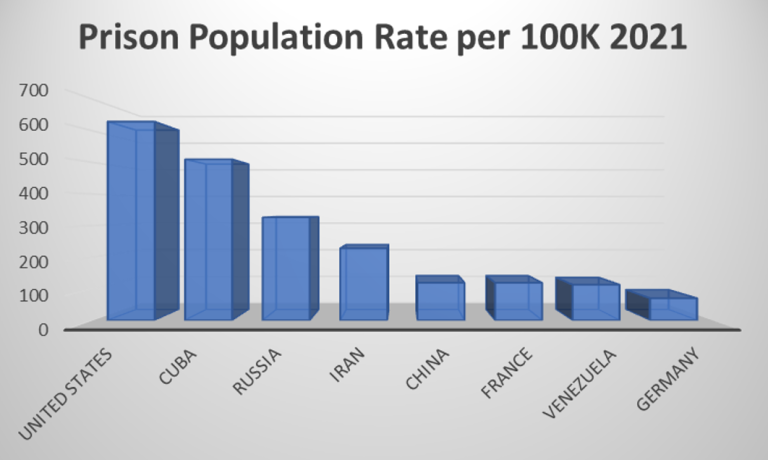
Graph: mass incarceration presents a conundrum for American Liberals. The US imprisons a much larger percentage of its population than so-called ‘authoritarian’ nations. What is this high rate of imprisonment if not authoritarian? It has a particular explanation— Richard Nixon’s war on drugs launched mass incarceration. But Nixon’s goal was to repress his political opposition, not to solve a public health emergency. What logic then led Liberals Bill Clinton and Joe Biden to double down on Nixon’s political repression with their 1994 Crime Bill? Source: worldpopulationreview.com.
This seeming American obsession with ideology rather than coalition politics emerges from the detachment from actual governance that the demos in the US faces. Over the last half-century, the political parties have consolidated their control over the electoral system. Through onerous registration procedures that require substantial and well-funded campaign infrastructure to get past, the US has a de facto duopoly electoral system in which Party leaderships, in consultation with their donors, decide who the candidates will be. This is why widely despised candidates end up as the only available choices in American elections.
Assertions from abroad, and occasionally from within the US, that Americans are politically, legally, and morally culpable for US foreign policy ignore that the electoral system is structured to assure that we, the people, not only don’t have a say, but that Federal censorship and propaganda efforts mean that most Americans are only fed lies regarding US actions in the world. The internal ‘debate’ within the US consists of CNN talking points versus MSNBC talking points, meaning that they are all State Department / CIA talking points.
Reflected in this dearth of national candor is an uninformed arrogance amongst individualists and collectivists alike with respect to world affairs. ‘We’ have strong views regarding events that this same we have little to no control over. The US proxy war in Ukraine and the genocide currently underway in Gaza have been underway is less visible forms for decades. And the bi-partisan gerontocracy in Washington is doing what it has always done. It is lying to we, the people, regarding its service to capital in the form of the MIC (military-industrial complex).
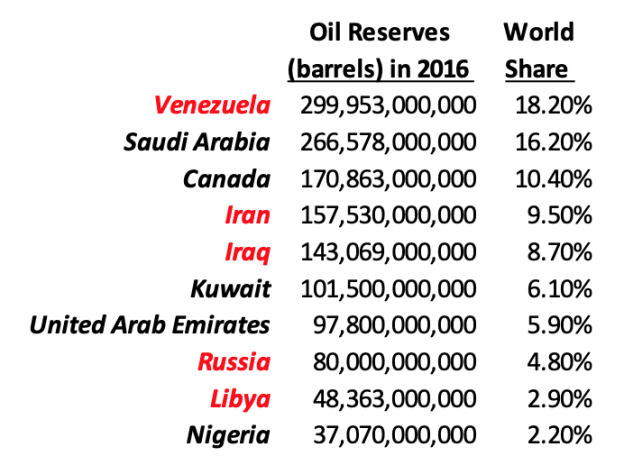
Graph: anyone who follows US foreign policy will recognize the names on this ranking of proved oil reserves by nation. The US has been trying to control Venezuela militarily since the start of the 20th century. Iran was a client state of the US until the Iranian Revolution (1979). It has been an enemy since. Iraq was substantially destroyed in George W. Bush’s misbegotten war begun in 2003. Russia is the object of the current US proxy war in Ukraine. And Libya was completely destroyed by Obama Secretary of State Hillary Clinton in the early 2010s. Source:
https://worldpopulationreview.com.
The reigning ethos of Liberalism, enshrined in the American Constitution and the Bill of Rights, has long represented one of the only true ‘isms,’ or political belief systems, by having so few of its expressions or corollaries found naturally in the world. For instance, ‘individuals’ rarely prosper outside of human societies. But Liberalism is hegemonic in Gramsci’s sense of a governing ideology that is so entrenched that it is invisible to those who embody it. This latter point is what makes Liberalism so easy to use as a demagogic battering ram. Appealing to received wisdom, whether correct or not, is much less onerous than challenging it.
However, knowingly reinforcing dubious received wisdom is a recipe for social catastrophe, witness the current situation. By withholding true information while promoting false information regarding US foreign policy, the US is currently engaged in two potentially-world-ending conflicts with only moronic delusion to guide it. After killing or permanently maiming 400,000 Ukrainians from some grotesque, geostrategic, brain-fart, the political leadership in the US is supporting and funding a WWII-like genocide in Gaza. These are Liberalism’s facts in 2023.
From a Marxist perspective, Liberalism is the ethos of capitalism with individuals as its alleged heroes. In this way, challenges to Liberalism have been easy to portray as threats to individuals and ‘rights.’ Question: if rights are given, why must they be fought for? The Civil Rights movement in the US didn’t claim pre-existing ‘rights,’ it was a power struggle against repressive forces. Had these rights pre-existed (e.g. speech), the Federal government would have been the arbiter. Instead, people died and got their heads cracked when forcing both the Federal government and states to honor what were claimed to be rights.
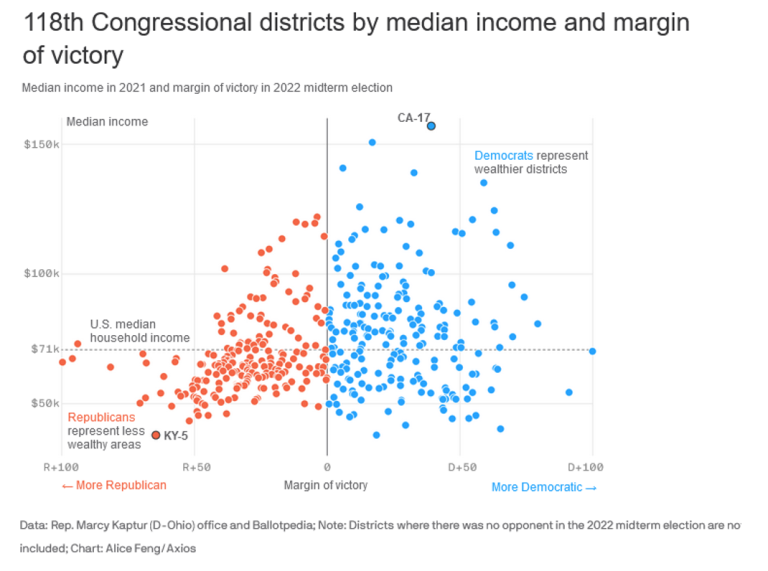
Graph: in 2022 Democrats were the Party of the existing order. Democratic Congressional Districts tended to have more rich and fewer poor people than Republican Districts. In class terms, this broadly breaks down as the ruling class— industrialists, financiers, and corporate executives, and the PMC (Professional Managerial Class), versus the poor, the dispossessed former Middle Class, and the petite bourgeoisie that finds itself on the wrong side of neoliberal reforms. Subsequently, as if on cue, Republicans dumped their fake anti-establishment persona when their favored colonial administrators (Israel) needed help with their genocide. The question in need of an answer is why Americans believe non-stop lies given how many ‘reveals’ after the fact they have been through. Source: axios.com.
An important difference between Liberalism and Marxist analysis with respect to ‘individuals’ centers on the social conditions necessary for self-realization, and not on individualism versus collectivism per se. Ironically, American Liberals are fine with employers telling people when to wake and when to sleep, where to go and what to do with their time, what to wear, the range of acceptable discourse, and which expressions of who we ‘really’ are are acceptable, and which aren’t. Why having an employer decide your life is ‘freedom,’ while having the Federal government do so is ‘authoritarian,’ isn’t precisely clear.
In the present, serial deception has divided the US into those who believe official lies and those who don’t. While much of this difference is Party partisans mindlessly believing whatever ‘their’ party puts forward, with it being changeable with their party’s fortunes, the widespread loathing of both Joe Biden and Donald Trump suggests underlying political currents that defy partisan explanations. It seems that the people who have benefitted economically from the established order and their ‘explainers’ in academia and the press by-and-large support the established order. Those on the outside, not so much.
American politics has long had a quasi-religious character through the distinction between what people believe and what they do, between faith and acts. So and so candidate believes what you believe, so you vote for them. But the electoral system— and with it ballot access, is controlled by the duopoly parties for the benefit of corporate executives and ‘investors.’ What the candidate believes has little bearing on how they legislate. For instance, Joe Biden ‘believes’ that the minimum wage should be higher. But he isn’t willing to favor the will of the people over the economic interests of his donors to raise it.
Along these lines, a recent editorial in the New York Times entitled ‘Why I am a Liberal,’ written by Harvard Law School professor Cass Sunstein, lays out a theoretical case for Liberalism, and in-so-doing, implies that the historical case is unsupportive by default. Despite having several centuries of history to draw from, Sunstein begins his piece with ‘this is what Liberals believe,’ signaling that he will define Liberalism aspirationally. Doing so is a good trick when it works. It keeps critics fantasizing in the realm of hypotheticals, and well away from the substance of history.
“Liberals believe in six things: freedom, human rights, pluralism, security, the rule of law and democracy. They believe not only in democracy, understood to require accountability to the people, but also in deliberative democracy, an approach that combines a commitment to reason giving in the public sphere with the commitment to accountability.” Cass Sunstein, New York Times.
In fact, few in the West would take issue with this list, most particularly ‘Left’ critics of Liberalism. That critique is 1) this is vague, virtue signaling, bullshit being used to cast the established order in a favorable light, not a political program, 2) that implies that a few simple reforms would align Liberal fantasies with the facts of actually existing capitalist democracy when over two hundred years of history have failed to do so, and 3) assumes no responsibility for the acts and policies of American Liberals who claim their actions are based in Liberal theory. A current favorite is the rehabilitation of Ukrainian Nazis by people who describe themselves as anti-fascists. What’s next, an ‘approved Nazis’ list?
The Times’ piece claims that Liberals value ‘freedom.’ The question then arises as to why the ‘free’ US has the largest proportion of its people in prison amongst peer, as well as ‘authoritarian,’ nations (chart above)? At least part of the answer lies with former US President Richard Nixon’s decision to launch the ‘war on drugs’ as a pretext for repressing domestic political opposition to his policies. That ‘Liberals’ Bill Clinton and Joe Biden followed Nixon’s political repression gambit with their 1994 Crime Bill illustrates the bi-partisan, and systematic, nature of domestic political repression.
For context, the US has about five times the proportion of its citizens in prison as ‘authoritarian’ China (chart above). It also holds multiples greater than Russia, Cuba, Venezuela, and Iran. Through so-called plea bargains— which are legalized extortion in most cases, those who can’t afford full-blown legal representation are given a choice between extortionate jury trial sentences and fractional plea bargain sentences. This has turned US prisons into warehouses for those for whom capitalism can’t create enough jobs, aka ‘the poor.’
Americans are repeatedly told that serial military mal-adventures are intended to liberate oppressed people from malevolent tyrants. If so, with 195 nations in the world today, why are the same half-dozen or so nations with the largest proved oil reserves (chart above) the main targets of US regime-change operations? A half-dozen is roughly three percent of 195 nations. And if fossil fuel reserves attract tyrants, what does this say about the most fossil-fuel obsessed nation on the planet, the US? In fact, it is American imperial interests that motivate US foreign policy.
From a different angle, at fifty-eight pages, this list of US military operations finds many of the same states and political actors being invaded and re-invaded by the US over this history, with a notable focus on those resource rich nations that the US political leadership used to loudly proclaim (see Eisenhower’s comments at opening of film) hold resources important to American oligarchs and corporations. From Teddie Roosevelt through Joe Biden, ‘kick their ass and steal their gas’ has been the operating ethos of the US military.
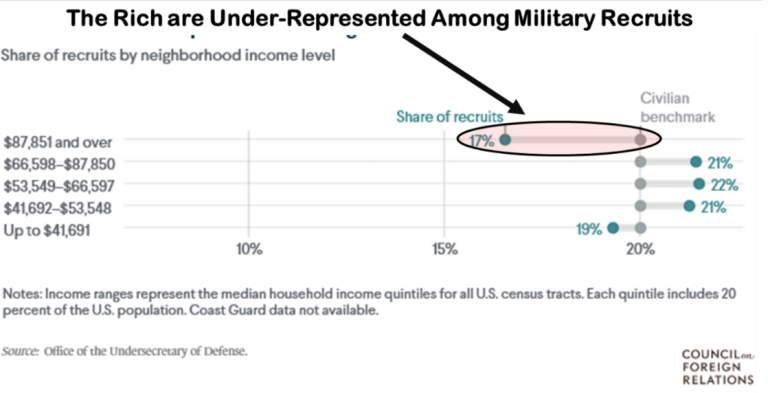
Chart: through the US MIC (Military Industrial Complex), the rich benefit economically from wars that are generally fought by the not-rich. This bifurcation, where one group reaps the benefits while another pays the costs, goes far in explaining the otherwise lunatic militarism of the US since WWII ended. Notably, the US never ‘wins’ these wars, whatever winning a war might look like. They feature twenty years of bombing wedding parties and Mosques before troops are withdrawn to be redeployed to the next manufactured catastrophe. Source: CFR.org.
But it isn’t the likes of the PMC who ‘kick their ass,’ a grotesque metaphor for wildly homicidal militarism. Despite Mr. Sunstein being a few years older than yours truly, there is no record of his military service during the Vietnam War. In the self-serving parlance of American political discourse, Liberals value ‘freedom,’ but leave it up to ‘the little people’ to secure it. Never mind that US foreign policy has always been imperialist slaughter for the benefit of capital, American Liberals so lack historical knowledge that they recently deemed all inconvenient history ‘whataboutism.’
“Liberals connect their opposition to censorship to their commitment to free and fair elections, which cannot exist if people are unable to speak as they wish. They cherish the right to vote.” Cass Sunstein, New York Times.
Using language intended to assuage Liberal sensibilities rather than to engage in critical analysis, Mr. Sunstein is apparently unaware that Liberal institutions in the US have engaged in full-throated censorship of political discourse and created and distributed state propaganda for most of the last century. From Operation Mockingbird through Carl Bernstein’s too-carefully-worded expose of CIA media manipulation to the revelations of the ‘Twitter Files,’ major American institutions (CIA, FBI, DNC) have not only censored inconvenient political analysis for decades, they have lied about doing so, occasionally under oath.

Picture: before Ukraine’s Azov Battalion were ‘freedom fighters’ they were Nazis. They weren’t ‘far-Right’ and they certainly weren’t ‘Liberal’ in the sense offered up by the New York Times. And then in Orwellian ‘Oceana has always been at war with Eastasia’ fashion, Adolf Hitler loving, Holocaust denying,’ Nazis’ were the best friends of American Liberals. The criticism isn’t just hypocrisy. Left critics of Liberalism actually do not support Nazis, be they Ukrainians or the American Liberals who support them. Source: wsws.org.
The methods of skirting domestic restrictions on censorship and propaganda are twofold: first, by getting so-called private institutions— corporations and NGOs, to carry out acts that would be illegal if the CIA were conducting them directly. And secondly, through institutional alliances like the Five Eyes, whereby foreign intelligence services can carry out acts that would be illegal if done domestically. With MI6 (Brits) maintaining the relationship with Ukrainian Nazis for the CIA after WWII, the CIA could deny that it ‘worked with Nazis’ while it worked with Nazis.
This ’wink and nod’ that has long facilitated CIA propaganda inside the US has also been insinuated into the cultural belief system through popular entertainment. The myth of ‘Liberal’ Hollywood, even through militaristic twaddle like Top Gun and American Sniper, has turned self-described Liberals into willing propagandists much like Leni Riefenstahlwas for the Third Reich. The myth of ‘good’ Nazis in Ukraine is a classic of the genre. Another is ‘just retribution,’ and another still is the exaggeration of US capabilities. For instance, pandemic films present intelligent and capable public health officials long after public health in the US had been abandoned.
With respect to ‘free and fair’ elections, by controlling ballot access, the duopoly parties control the choice of candidates. In the run-up to the 2016 election, the DNC not only openly cheated Bernie Sanders out of the nomination, it argued that it had no legal obligation to hold ‘free and fair’ Democratic Party primaries. This would mean one thing if the duopoly parties hadn’t spent decades creating the infrastructure needed to effectively exclude third parties from competing in US elections, and another given that they now have effective control of the electoral process.
The obvious push-back to rigged primaries is that primaries aren’t national elections. But again, duopoly party control over ballot access limits the range of political views / interests represented in ‘official’ politics to those favored by the power behind the duopoly parties. This is to write that while Donald Trump isn’t Joe Biden— they are separate and distinct people, they both represent the views and interests of the power behind the duopoly parties. Conversely, implied in the fact of duopoly party control of ballot access is that political decision making must not be left to the demos.
As the saying goes, ‘if voting changed anything, they would make it illegal.’ In fact, as the duopoly parties have learned, by constraining the choice of candidates through control of ballot access, they have maintained the illusion of democratic choice while assuring that doing so poses no danger to entrenched political and economic power. The result: voters have been fleeing the duopoly parties for three decades now. But with nowhere else to go when it’s time to vote, widely detested establishment candidates continue to be the public face of this fake democracy.
His being a law professor suggests that Mr. Sunstein should know this history. And his being a law professor suggests that Mr. Sunstein shouldn’t know this history. By analogy, here The Grayzone’s Max Blumenthal interviews a representative of CIA cutout NED (National Endowment for Democracy), Leslie Aun, who appears to know absolutely nothing about the agency she is defending. What Aun does do well is put up theoretical defenses of NED in place of defending its history. The point: theoretical defenses loaded with emotive drivel about ‘freedom’ and ‘democracy’ are intended to hide their subjects, not to illuminate them.
Ironically, Liberal critiques of other purported ideologies such as Socialism and Communism tend to be based on divergences between theory and realized fact. Noam Chomsky’s Liberal critique of Lenin and the Russian Revolution amounts to the complaint that actual history failed to comport with explanations of how Socialism should work in theory. While actual Socialists and Communists have long grappled with this distance between their political aspirations and the burden of history, the tendency of Western Liberals has been to restate their own moral superiority through what they believe, rather than how they act.
Why this matters, with a superficial irony alert, is that Socialist and Communist critiques of Liberalism tend towards its facts as the ethos of capitalism, and not a rejection of the concept of self-determination as Liberals generally claim. To pull these obvious but necessary abstractions together, much of the ‘Left’ quarrel with Liberalism is that it doesn’t do what its proponents claim that it does. If it did, Mr. Sunstein would be deferring to this supporting history. But actual American history looks almost nothing like what its Liberal apologists claim.
In terms of ‘principles,’ American Liberals invested tremendous energy into politically hobbling and then ousting Donald Trump, the man who unambiguously won an election in what they (Liberals) regularly proclaim to be a free and fair electoral system. Where was the principle that Trump was the duly elected President of the United States to be found? Half the country voted for the guy. What of their ‘right’ to be represented by the person they voted for? While my take is that Trump is at least 10% as evil as Joe Biden, I’ve never voted for either of them. And I have no intention of doing so in the future. The problem is the system, not the candidates.
Question: who spends four years denying the validity of an election because they don’t like the outcome? If the problem is the electoral system, that is what needs to be addressed. But the Liberal argument was / is that the system is fine. Likewise, the CIA and FBI don’t have standing to opine on domestic politics unless a ‘process’ charge that an election wasn’t on the up-and-up has been raised. But the only process charge that was raised regarding the 2016 election, Russiagate, was a fraud invented by the losing candidate to take the focus off of her venality, incompetence, and widespread unpopularity.
Luckily for readers, Hollywood has already provided comic relief with the (Klaus) Barbie Museum. In real life, Mr. Barbie (aka the ‘Butcher of Lyon’) lived out his post-WWII years as a ‘torture consultant’ to the CIA. His contributions included murder, torture, and managing local and regional Black Ops, including the murder of Che Guevara, for the CIA. This is a fact of Liberalism that its theorists choose not to explain. Why? Because there is no gain to be made from doing so. Spouting platitudes is easier, causes less consternation, and garners pats on the back from the War Crimes R Us crowd.
This entry was posted in Banana republic, Economic fundamentals, Free markets and their discontents, Guest Post, Income disparity, Politics, Social policy, Social values, The destruction of the middle class on December 5, 2023 by Yves Smith.
https://www.nakedcapitalism.com/2023/12 ... -west.html
******
BILLIONAIRES DO NOT CREATE WEALTH OF THEIR OWN, THEY INHERIT IT
Dec 4, 2023 , 3:22 pm .

Among the 137 new billionaires, a total of 150.8 billion dollars were inherited to 53 heirs during the last year (Photo: File)
A report from Swiss bank USB reveals that global billionaires have for the first time accumulated more wealth through inheritance than through entrepreneurship, in a period when the transfer of capital is gaining momentum. The study titled "Billionaire Ambitions 2023" also notes that the number of billionaires increased and their global wealth increased last year.
According to the report, the number of billionaires rose 7% worldwide, reaching 2,544 people, while their total wealth increased 9%, reaching approximately 12 trillion dollars.
This is the first time, since the study began in 2015, that billionaires accumulate more wealth through inheritances than through their own business activities, which suggests that in that world the much-touted meritocracy of the rich does not exist.
Among the 137 new billionaires, a total of $150.8 billion was inherited to 53 heirs over the past year, surpassing the $140.7 billion generated by the 84 new self-made billionaires, the bank said.
One of the most interesting findings is that a time has been reached in which there are numerous multi-millionaire families made up of several generations, in which the owners and still in charge of industries and conglomerates can be up to octogenarians, with children over 50 years old. that they will soon inherit and take over. This trend is expected to continue for the next 20 years.
https://misionverdad.com/los-multimillo ... la-heredan
Google Translator





























